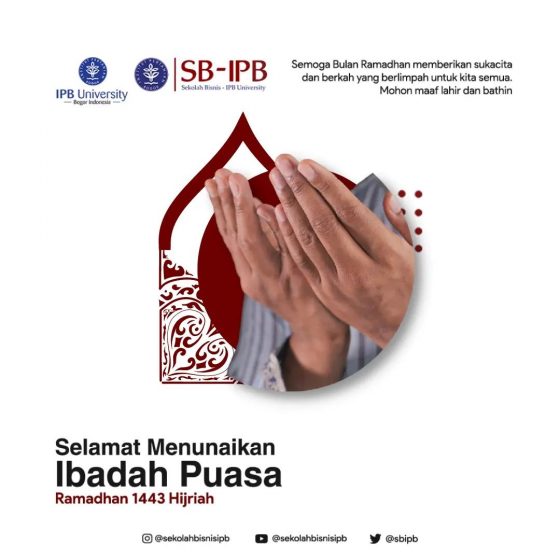
Marhaban Yaa Ramadhan 1443 H.
Sekolah Bisnis IPB University mengucapkan Selamat menunaikan ibadah puasa di bulan Ramadhan bagi yang menjalankan.
Mari menyambut Ramadhan dengan hati yang bersih. Semoga kita semua senantiasa mendapatkan limpahan rahmatNya dan diberikan kelancaran dalam beribadah Aamiin.
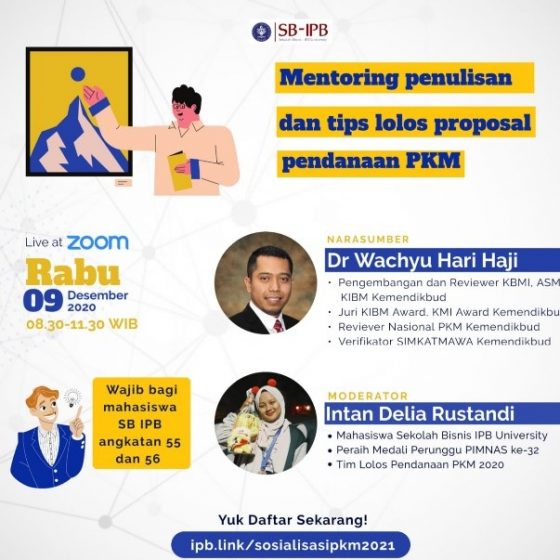
PKM Training : Tips How to Sucess and Get Funding from PKM 2021
Wednesday, December 9, 2020, the IPB Business School held socialization for Student Creativity Week activities with the theme of the activity “Mentoring for Proposal Writing and Tips for Passing PKM Funding in 2021”, this activity aims to provide direction on writing PKM proposals so that they pass the funding and pass PIMNAS. The event was held virtually through Zoom Meetings at 08.30-11.30 WIB and was opened by the Vice Dean for Academic and Student Affairs for the IPB Business School, Dr. Ir. Idqan Fahmi, M.Ec.
The resource person for this activity is Dr. Wachyu Hari Haji, he is a national reviewer of PKM Kemendikbud, developer, reviewer of KBMI, ASMI, and KIBM Kemendikbud. In addition, he is a verifier of the Ministry of Education and Culture’s SMIKATMAWA.
The resource person explained the things that need to be considered based on the reviewer’s point of view. Tips for passing the selection include prioritizing quality. He also explained the reasons for the proposal being rejected, namely wrong format or administration (not according to the guidelines), the topic of the proposal that was frequently submitted, repeated or was very general, and the purpose of the proposal was not in accordance with the program field to be followed. The writing format is the first thing to be checked, the PKM writing format generally includes A4 layout with Left Margin: 4 cm; Top, Right, Bottom 3 cm, font, Times New Roman 12, Space, 1.15 (distance between paragraphs may not be 1.15), Page number, Table of contents: Bottom Right (i, ii, iii), Chapter 1 Introduction sd. Attachment: Top Right (1,2,3,4….), Number of Pages: Chapter 1 Introduction sd. Bibliography: Maximum 10 Pages.
After that, the resource person explained the writing format of 8 fields of Student Creativity Program (PKM) starting from PKM 5 fields (PKM Research, PKM Entrepreneurship, PKM Community Service, PKM Technology, PKM Creative Initiative), PKM Scientific Articles, PKM Written Ideas, and PKM Constructive Futuristic Ideas. Starting from the cover presentation and the validation sheet which is made separately, the writing systematics of each CHAPTER, the attachment of biographical data for applicants and members, the chairman’s statement letter, the team’s organizational structure, and bibliography. The activity was continued with a question and answer session, students asked about which ideas were more relevant to which field, and some students who had participated in PKM asked about their PKM ideas that did not pass PIMNAS and what factors made these ideas not pass.
After that, the activity was continued with a question and answer session and the announcement of the PKM proposal competition for the IPB Business School level.
The hope is that with this PKM socialization, SB IPB students can design proposals according to the latest PKM guidelines and get an understanding of preparing proposals from the perspective of the reviewer. Besides that, this socialization is also SB’s step to prepare proposals and the best teams are ready to take part in PKM and PIMNAS 2021.
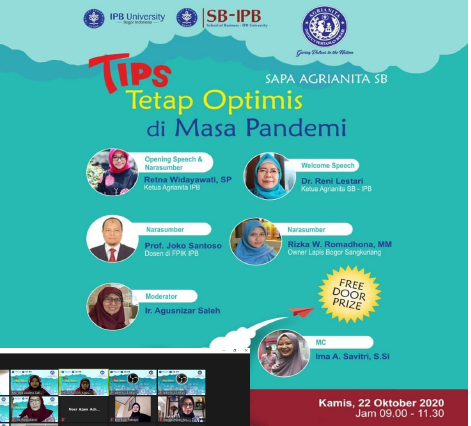
Sapa Agrianita – Tips to Stay Optimistic During the Pandemic
Agrianita SB-IPB University held a SAPA AGRIANITA webinar with the theme “Tips for Staying Optimistic in Pandemic Times”. On this occasion, Agrianita SB-IPB University presented resource persons who had direct experience of the impact of the pandemic, be it experiences as a Covid-19 survivor attended by Prof. Joko Santoso who is also a lecturer from the Faculty of Fisheries and Marine Sciences of IPB University, Family of Covid-19 survivors, namely Retna Widyawati, SP who is also the Chair of Agrianita IPB University and the wife of the Rector of IPB University, Prof. Dr. Arif Satria. As well as businessman Rizka W. Romadhona, MM is an alumnus of SB-IPB University and the owner of the Lapis Bogor Sangkuriang business. This webinar was also moderated by Ir. Agusnizar Saleh as a member of Agrianita SB-IPB and presented by Ima A. Savitri S.Si as a representative of IPB Business School.
The event begins with a speech by Dr. Reni Lestari as Chairperson of Agrianita SB-IPB University. He said that the Sapa Agrianita activity is a routine event organized by Agrianita IPB University which carries various interesting and useful themes. Opening Speech was also delivered by Ina Agus Purwito as Head of the Arts, Sports and Spirituality Agrianita IPB University. On his occasion, he said that the current pandemic conditions it has limited us from doing activities, economic conditions, and so on. Therefore, this webinar activity is expected to provide enthusiasm and new learning to stay optimistic during a pandemic. The remarks also marked the opening of the Sapa Agrianita webinar.
In his presentation, Prof. Joko Santoso shared his experiences as a Covid-19 survivor. He concluded that this pandemic condition should be used as a moment to strengthen immunity, namely faith-immunity-safe. Always have a good prejudice against the Creator that all the conditions given will have wisdom behind it all. Keep up the spirit by building a strong mentality, support from the core family, and obeying health protocols from experts. Furthermore, the explanation from Retna Widyawati, SP also shared her experience as a family of Covid-19 survivors, that family function is very important compared to the patient himself. According to him, in dealing with these conditions it is important to spread a sense of optimism, assuming that a positive attitude can be transmitted to the patient’s condition. A positive attitude in yourself will also have a good impact on decision making so that it will produce a productive attitude.
The last presentation was by Rizka Rizka W. Romadhona, MM who is also the owner of the Agrinesia company with its various cake products, namely Lapis Bogor Sangkuriang, Bolu Susu Lembang, Bolu Singosari Malang, and so on. In his presentation, this pandemic condition is a moment to still be able to take advantage of opportunities compared to the crisis itself. Changes in consumer behavior in current conditions force companies to continue to analyze the situation and consumer needs to produce various innovations to still be able to deliver products into the hands of consumers. Also, adapt and transform sales channels. Currently, offline sales are a new concern for consumers so that companies innovate to create applications and enter the world of e-commerce to sell their products online. although there were many complaints at the beginning, this has become the trigger for a better sales system and continues to grow until now.
The event was continued with a question and answer session and sharing of other experiences as a family of Covid-19 survivors. The event was closed with an appreciation and group photo.
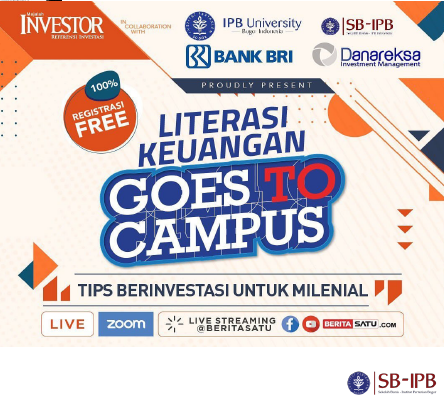
Financial Literacy Goes To Campus, Investment Tips For Millennials
IPB University Business School (SB-IPB) and IPB University are collaborating with Berita Satu Media Holding, the Financial Services Authority (OJK), Bank Rakyat Indonesia (BRI), and PT Danareksa Investment Management to hold a financial literacy event goes to campus which is held regularly online on Thursday (15/10). Raising the topic “Investment Tips for Millennials”, this event was attended by 550 people in the Zoom meeting room and 1424 people listening through the live streaming of the Berita Satu Youtube account. The webinar activity does not only run in one direction, participants actively participate in discussion sessions, quizzes, and the Instagram repost challenge which prizes various interesting door prizes.
The SB-IPB financial literacy activity goes to campus presented a keynote speaker, Member of the OJK Board of Commissioners for Consumer Education and Protection, Tirta Segara, SE, MBA. Other speakers at the panel discussion were also presented, including 1) Executive Vice President of Wealth Management Division of BRI, Tina Meilina, CWM, CFP; (2) President Director of Danareksa Investment Management, Marsangap P Tamba, MSc; and (3) Dean of the IPB Business School, Prof. Dr. Ir. Noer Azam Achsani, MS. Vice Rector for Education and Student Affairs of IPB University, Dr. Ir. Drajat Martiato, MSi represented the Rector of IPB to give a speech. The event was opened by Poppy Zeidra as the host followed by singing again Indonesia Raya, opening speech, presentation of material, followed by a panel discussion moderated by News Director BeritaSatu Media Holdings, Primus Dorimulu.
While fighting the health crisis and returning the wheels of the economy due to the Covid-19 pandemic, financial literacy is believed to play a strategic role in the country’s economic recovery. “Millennials are currently 1/3 of Indonesia’s population with the main characteristic of being dependent on the internet and gadgets. Millennials who have set aside funds from their income for new investments are 2%. The financial challenges faced by millennials include lifestyle pressures, lack of knowledge about finance, and a lot of forests and wasteful experience to gain ”. Said Tina.
Tirta Segara explained five reasons why the habit of saving and investing should continue to be instilled in millennials from an early age, including 1) millennials are the nation’s next generation, 2) low levels of financial literacy according to the OJK survey, 3) more vulnerable financially, 4) no prepare an emergency fund, and 5) alert illegal investments. Investing is often seen as something scary, but it can be easier to understand if you understand the basic principles of investing, namely planning, execution, and monitoring. Tirta shared investment tips for millennials, “Investing for millennials can be done by understanding the character and financial condition, recognizing investment products, starting small, diversifying investments, not getting emotional, and ensuring 2L Legal and Logical”.
“Investments need to be planned with specific goals, such as investments with plans to buy a house, education costs, etc. Choosing an investment product is also a plan, to match the goals and abilities of millennials when they first invest. After making a plan, execute! Invest by the predetermined plan and monitor investment developments intensively to find out what steps can be taken in the future. Investment plays an important role in protecting the value of money, uncertainty in the future, and retirement plans, “said Tina.
“Smart tips for managing finances for millennials are allocating their income with a 4-3-2-1 formula, 40% for daily needs, 30% for debt needs, 20% for investment and insurance needs, and 10% for social needs. spending priorities, try to only have ‘good debt’, determine your investment goals, understand the financial products, don’t forget to prepare an emergency fund, then start investing and buying insurance products because we need protection, take advantage of the ‘auto-debit’ account facility, and must be disciplined in managing finances. ” Tina explained that she shared tips on managing finances for millennials.
Investment is a solution to more optimal financial goals. Marsangap suggested, “Mutual fund investment can be used as an easy-to-reach investment alternative for novice investors”. Finally, Prof. Dr. Ir. Noer Azam Achsani, MS explained tips on investing in the real sector. Furthermore, Okty Shalihati shared tips for budding entrepreneurs to obtain funds from investors. “Tips to convince investors, make a proper pitch deck flow for the session and master the discussion session”.
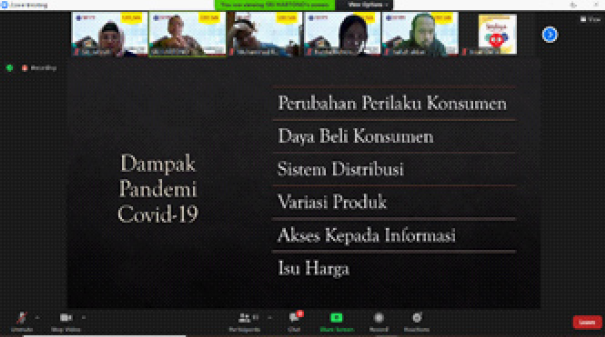
Driven Strategy: Understanding Markets and Consumers During the Pandemic
On October 15, 2020, Dr. Ir. Sri Hartono MM, CMA, CHRA would like to share his experiences with students of the SB-IPB Undergraduate Program. He is the CEO of PT Catur Pilar Jaya and the CEO of PT BMS Group, a trainer and management consultant as well as teaching at Postgraduate SB-IPB, UMB, and UNPAK. He has experience working in various multinational companies such as PT Meiji Indonesia, PT Sandoz Indonesia, PT Casana Prima, PT SLH Prima, and PT GlaxoSmithKline Indonesia. He delivered material on Market Driven Strategy: Understanding Markets and Consumers During the Pandemic.
The market during the Normal vs New Normal period, which under normal conditions is demanded to be focused, consistent, the best marketing strategy, flexibility, and high competition. During the New Normal period, there were four mega shifts, namely, stay at home lifestyle, the bottom of the pyramid, go virtual and empathic society. The impact of the Covid-19 pandemic is changing in consumer behavior, consumer purchasing power, distribution systems, product variations, access to information, and price issues. There are four characteristics of a market-driven strategy, namely becoming market-orientation, determining distinctive capabilities, customer value/capabilities match, and achieving superior performance.
These four things are like a rotating cycle.
Six practical steps to retaining customers you can take are to change the mindset, listen to the customer, follow their line of thinking, make connections, recommend your solution as a match, and exceed expectations above and beyond expectations. First, changing the mindset can be done with a focus on customers, creating value and innovation is a necessity. Second, listen to customers by being good listeners, rejection is an opportunity, and remember that customers are unique. All three follow their path by simply following, refining existing ones, and being more flexible.
Fourth, make a connection by taking advantage of all access, being creative is not enough, make sure you are connected and don’t be lazy. Fifth, your recommendation as a suitable solution through being an expert, mastering product knowledge, and meeting customer expectations. Finally, go above and beyond expectations by giving your best, be the first, and don’t be stingy.
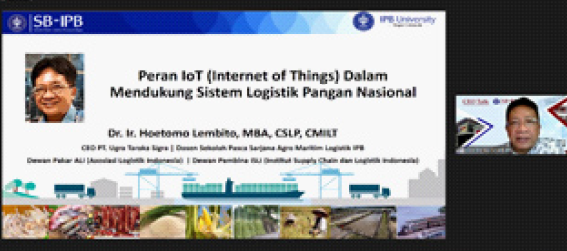
The Role of IoT (Internet of Things) in Supporting the National Food Logistics System
Kapita Selecta Management and Business (KSMB) Class R63 & R64 on October 13, 2020, Mr. Hoetomo Lembito wishes to share about the role of IoT (Internet of Thing) in Supporting the National Food Logistics System. He is the CEO of PT Ugra Takara Sigra, the Board of Experts of ALI (Indonesian Logistics Association), the Board of Trustees of ISLI (Indonesian Institute of Supply Chain and Logistics), and a Lecturer at the Postgraduate School of Agro Maritime Logistics IPB University. He completed S1 from IPB, S2 from PSBA (Philippine School Business Administration), and S3 from SB-IPB University.
The national food system is built with the spirit/foundation of food sovereignty and self-sufficiency, performance measures seen from national food security in which there is food security, the outcome is that individuals and communities can live healthy, active, and productive lives sustainably. The impact of Covid-19 on national resilience is the disruption of agricultural production due to restrictions on the movement of people/labor, a decrease in people’s purchasing power of demand for agricultural products, disruption of food distribution due to the implementation of PSBB, and limited area closure, farmers vulnerable to Covid-19, the potential food crisis, and threats to the availability of national food stocks originating from imports such as wheat, sugar, beef, garlic, and soybeans. The policies and programs of the Ministry of Agriculture are to increase the productivity of staple foods, facilitate food distribution, facilitate access to transportation, maintain price stability, and develop and intervene in markets.
The target is an increase in farmer exchange rates.
The national logistics system has been built based on supply chain management, the paradigm of “ship follows the trade and ship promote the trade” and uses an approach of six key logistic drivers (six key drivers). The six key drivers of logistics are commodities, infrastructure, actors and service providers, human resources, ICT, and regulations. The national logistics network is built with the integration of local and national networks as well as global network connections.
Information technology and digitalization have entered all aspects of life. The focus of the logistics strategy with IoT is last-mile distribution (responsiveness), strengthening the flow of goods from rural areas, between islands and IKM clusters (efficiency), as well as modes of transportation and warehousing (responsiveness and efficiency). The conventional food and agro logistics system is required to become a high-precision food and agro logistics system (smart, adaptive, and resilient) by utilizing ever-evolving information technology. So, the food supply chain will be transformed with Blockchain and IoT
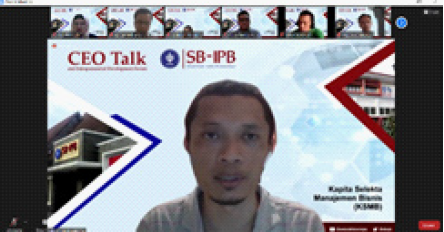
Managerial Experience of Electricity Business Development in Multinational Companies
At the Kapita Selekta Management and Business (KSMB) Masters Study Program Class E72 on October 10, 2020, presented a speaker Mr. YB Andhi Marjono, PhD who shared his managerial experiences in developing electricity business in multinational companies. Currently, Mr. Andhi is a Business Development Director at Electricite de France, previously he worked at several companies such as Worley Parsons in Jakarta, Schlumberger R&D in Japan, Schlumberger Middle East in the UAE and Saudi Arabia, and Adaro Power in Jakarta. He completed his S1 from ITB and S3 from Tokyo University of Electro-communications in Japan in Mechanical Engineering and Intelligent Systems.
Mr. Andhi shared his experiences in various situations by taking into account the strength of his scope, consisting of emotional, relational, execution, and thinking. While working as a physicist engineering in Tokyo for three years, mostly in the laboratory, he emphasized the importance of critical thinking and creativity, especially to think out of the box. From life in the laboratory to the field in the UAE and Saudi Arabia demands strong emotional control and resilience. Cultural differences and field activities that require a good physique have forged him to become a tough figure. When he returned to Japan and became a technical project leader, having to deal with experts from various fields required him to have strong relationship building and collaboration.
Electricite de France (EDF) which is the world’s leading electricity company. This company covers all businesses in the electricity value chain from generation, distribution, energy transmission, and even trading activities. EDF is a producer of renewable electricity in Europe. He is currently at EDF Indonesia and focuses on renewable energy which presents its challenges to further highlight all the strengths of his strength scope.
From these experiences, he gave messages to focus on our strengths, how to continue to hone our strengths. Sometimes we focus more on weaknesses and try to eliminate weaknesses that cause our strengths to become dull.
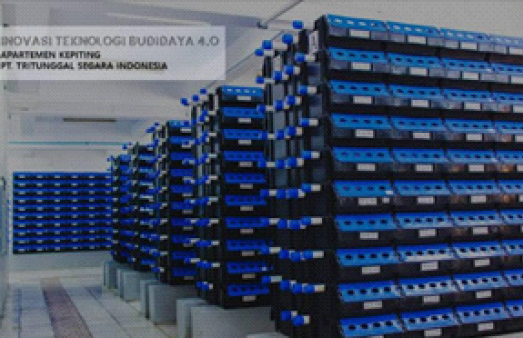
Crab Business with Technology Innovation 4.0 Crab Apartments
On October 8, 2020, the IPB University Business School successfully presented Mr. Hendra Sugandhi in the CEO & Leadership Forum for the Bachelor of Business Program. Mr. Hendra is the Managing Director of PT Tritunggal Segara Indonesia. On this occasion, he shared a lot of experiences and education related to the crab business. In more detail, he conveyed about the crab business with technological innovation 4.0 or it can be said as the Crab Apartment.
Mr. Hendra Sugandhi said that on September 28, 2018, PT Tritunggal Segara Indonesia collaborated with IPB University to develop a research and cultivation fishery business model, especially the crab apartment at IPB Fisheries and Marine Observation Station (IFMOS) Ancol. The Crab Apartment is the result of developing technological innovations in vertical crab cultivation. By placing it vertically, it turns out that there are many advantages and benefits, including saving land; prevent cannibalism and predators; more effective and efficient feeding; hygienic; faster crab growth; and water management is maintained and controlled.
In the end, Mr. Hendra provided data information that could be used as business opportunities, especially opportunities from the crab business. Why the crab business? Indonesia has high potential because it has extensive mangrove forests. Total demand and high export prices. The length of time for cultivation is relatively short. Indonesia is the 5th largest crab exporting country in the world.
Not only humans own apartments, but crabs too.
What have learned from this CEO & Leadership Forum is to research so that we know what to do in the future and minimize risks, the second thing is to learn how to collaborate well and know the business flows that can support our business going forward.

7 Habits of Highly Effective People Training
IPB University’s Business School and IPB University’s Human Resources Directorate have held a “7 Habits of Highly Effective People” Training for IPB University Education Personnel from 29 September 2020 to 02 October 2020.
This training is expected to provide a comprehensive understanding of IPB University Education Personnel on how to maximize their potential, both for professional and personal interests.
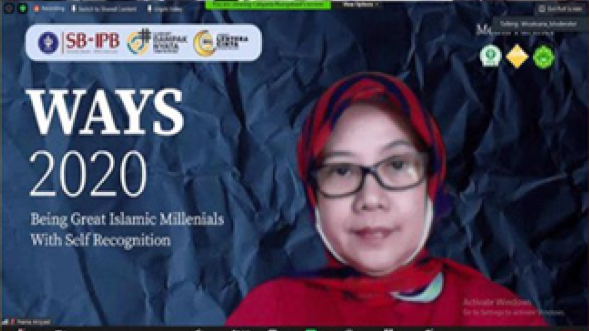
WAYS (Wonderful Achievment for Young and Special Generations) 2020
The role of youth in building Islamic civilization has been undoubted since the time of the Prophets. Becoming such a great person certainly has its challenges, especially for millennials in this digital era. When a Muslim youth wants to take part in the struggle for da’wah and take part in society, he should be able to identify more deeply about himself and what Islam is more deeply about. Then, how can a young man know himself and Islam more deeply? What is the importance of this? How are the steps of the youth today when they want to take a role in society?
On Sunday, October 4, 2020, WAYS (Wonderful Achievement for Young and Special Generations) 2020 was held to discuss this issue. WAYS 2020 is a joint work program between BEM SB-IPB and Rohis SB-IPB Family. This event was packaged in the form of a webinar with the theme “Being Great Islamic Millennials with Self Recognition” and was attended by 138 participants from various regions. This activity was guided by Bhirawa Ananditya Wicaksana, Chair of BEM KM IPB 2019/2020, as a moderator and presented two great speakers. The first speaker at this event, namely Habib Husein Ja’far Al Hadar. He is a preacher, well-known writer, and caregiver of “Kultum Pemuda Tersesat”. Then, the second speaker at this event was dr. Gamal Albinsaid, M.Biomed. He is a doctor, health innovator, social entrepreneur, and also an inspiration for Indonesia’s pride. He is the CEO of Indonesia Medika and has received many awards both domestically and internationally.
In the first discussion, Habib Husein Ja’far Al Hadar explains how the basics of the teachings of Islam are. He explained about prayer in Islam, amar ma’ruf nahi munkar, and other daily worship. Then, the most important thing is how we can stay istiqomah in carrying out this daily practice and try to maintain the quality of our faith. Furthermore, dr. Gamal explained how Muslim youths can identify themselves, optimize their potential, and take part in society. dr. Gamal talked a lot about the various experiences he had gone through. He told the story of seeing a scavenger child who died in his father’s cart due to illness and was unable to seek treatment which eventually motivated him to develop various health innovations. Then dr. Gamal explained how youths take part in society, one of which is through social entrepreneurship. If you follow your passion, money, people, and impact will follow you (Gamal Albinsaid).






Recent Comments